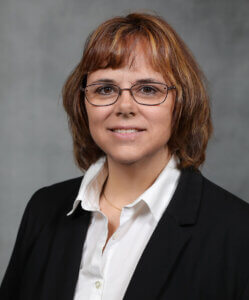KEARNEY – Beth Hinga, assistant to the senior vice chancellor for academic affairs at UNK, is among 34 higher education professionals selected by the American Association of State Colleges and Universities (AASCU) for its 2023 Becoming a Provost Academy (BAPA).

Co-sponsored by AASCU and the American Academic Leadership Institute, BAPA is a yearlong program designed for experienced academic affairs senior administrators – such as deans, assistant or associate provosts and other campus administrators – who aspire to take their career to the next level by becoming a provost or chief academic officer position.
This comprehensive leadership program provides a deep understanding of the areas of most critical concerns for provosts, as well as a framework that will help participants appreciate the broader context that guides how their institutions operate and develop perspectives. Also, the theme of diversity, equity and inclusion will be incorporated throughout the program. The cohort will be led by national subject matter experts, including AASCU provosts, presidents and chancellors.
BAPA also nurtures an environment of support, which includes mentoring and peer-to-peer learning.
“As the country’s student populations become increasingly more diverse, it’s imperative for there to also be a diverse leadership pipeline to educate and prepare them to be global citizens in today’s society,” said Terry Brown, AASCU’s vice president of academic innovation and transformation. “The Becoming a Provost Academy helps to fill this pipeline by providing an invaluable learning experience for hopeful provosts who will serve the needs of today’s diverse students, many of whom are first-generation, low-income and students of color.”
The 2023-24 BAPA cohort can be viewed on the AASCU website.
The AASCU is a Washington, D.C.-based higher education association of 350 public colleges, universities and systems whose members share a learning- and teaching-centered culture, a historic commitment to underserved student populations, and a dedication to research and creativity that advances their regions’ economic progress and cultural development.
